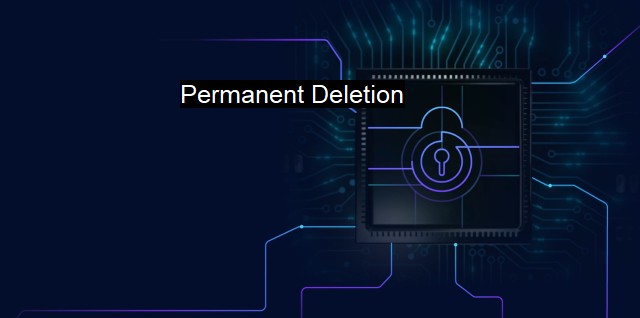What is Permanent Deletion?
Why Permanent Deletion Matters: Safeguarding Digital Data from Cyber Threats and Unauthorized Access
Permanent deletion, with is a crucial concept identified as the absolute expulsion or eradication of digital data from any storage device with no chance of recovery. It solely refers to the irrevocable removal of digital files, leaving them irretrievable, irrespective of the technique used. The need for data to be permanently deleted often arises in both personal computer use and at an organizational level, particularly when sensitive or confidential information irrelevance manifests.Cybersecurity arrangements emphasize the idea of permanent deletion as this ensures that outdated or no longer required data is not accessible to potential cyber threats. After all, the information paradoxically still exists in most instances in which digital data are ‘deleted’ from electronic storage devices. Merely deleting files and even emptying the recycling bin or trash in an operating system does not mean the data points in question have irrevocably disappeared. Rather, the information remains present in the device’s storage medium and can be recovered using special tools or software.
This is where permanent deletion steps in. There exist proprietary and open-source software solutions which can permanently delete files, often employing advanced strategies to make this possible. It isn't merely about eradicating the files; these tools and methods typically overwrite the specific sections of the storage medium where the data initially resided.
One common method used in permanent deletion of digital data is data wiping — the process involves overwriting the entire hard drive with zeroes or junk data, thereby effectively destroying all previously stored data. Similarly, degaussing is another technique used to rid magnetic-based storage of data permanently. It uses a high-powered magnet to disrupt the magnetic domains where data is stored. these methods expunge all links to the original storage space, rendering the information stored therein irrecoverable.
File shredding, too, is another process that ensures permanent deletion of digital data. It involves cutting up a digital file into smaller parts and then overwriting it with random data several times – much like the physical process of shredding paper documents.
When referring to antivirus systems, a key feature most of them incorporate is the capacity to execute permanent deletion tasks on potentially perilous files. Both identified malware and unnecessary system files are found and permanently deleted to prevent further infection or repetitious data clutter.
Permanent deletion is a double-edged sword. While it contributes to fortification against digital threats, it may also be used as a tool for breaching cybersecurity. Malicious entities can potentially impermanently delete crucial system files or personal data, rendering it irrecoverable and causing considerable damage.
Therefore, it is vital to carry out permanent deletion responsibly. A considered approach to permanent deletion ensures that indefinitely relevant data is backed up. This is commonly done either physically on an external hard drive, or remotely, via cloud-based storage.
Permanent deletion within the context of cybersecurity and antivirus plays a central role in tenants of ‘clean’ digital space and system resilience. It transcends merely 'emptying trash' and actively facilitates the total, irrevocable erasure of digital data. Despite its dual-faceted potential for misuse, its ethical and precise utilization complements the security ecosystem's efficiency and effectiveness. Ensuring responsible use and data backup makes permanent deletion an asset in maintaining comprehensive digital security. its integration within antivirus systems amplifies the protection of personal and organizational data, providing a robust shield against potential cyber threats.

Permanent Deletion FAQs
What is permanent deletion in cybersecurity?
Permanent deletion in cybersecurity refers to the complete removal of data from a system, making it unrecoverable even with the use of advanced data recovery tools.Why is permanent deletion important in cybersecurity?
Permanent deletion is important in cybersecurity to prevent the unauthorized access or misuse of sensitive information. By permanently deleting data, it reduces the risk of data breaches and identity theft.How does antivirus software ensure permanent deletion?
Antivirus software uses advanced algorithms to permanently delete files from a system. Instead of simply removing data from the file system, antivirus software overwrites the data with random characters, making it impossible to recover the original information.Is it possible to recover data after it has been permanently deleted?
No, it is not possible to recover data once it has been permanently deleted. Even with the use of advanced data recovery tools, the data has been completely overwritten with random characters, making it unrecoverable.| | A | | | B | | | C | | | D | | | E | | | F | | | G | | | H | | | I | | | J | | | K | | | L | | | M | |
| | N | | | O | | | P | | | Q | | | R | | | S | | | T | | | U | | | V | | | W | | | X | | | Y | | | Z | |
| | 1 | | | 2 | | | 3 | | | 4 | | | 7 | | | 8 | | |||||||